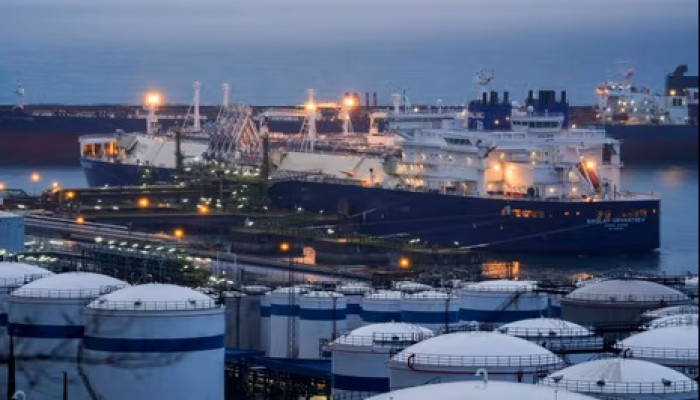EU sees 40% surge in imports of Russian LNG following Ukraine invasion
- In Military & Strategic Affairs
- 12:52 PM, Aug 31, 2023
- Myind Staff
According to reports, despite efforts to reduce supplies, EU imports of Russian liquefied natural gas (LNG) have surged by 40% since the invasion of Ukraine. As per data analyzed by Kpler, a marine and tanker traffic tracking firm, member states have purchased over half of Russia's LNG on the market during the first seven months of this year. Spain and Belgium, serving as major gateways for the bloc's LNG supplies, have become the second and third-largest customers for Russian LNG respectively, following China.
Jonathan Noronha-Gant, a senior fossil fuel campaigner at the anti-corruption group Global Witness, which conducted the analysis, stated, "EU countries now buy the majority of Russia's supply, propping up one of the Kremlin's most important sources of revenue."
Although Europe's pipeline gas flows from Russia have reached historic lows since the invasion, cooled LNG shipments from around the world, including Russia, have surged to compensate for the shortfall. These shipments are not subject to EU sanctions.
According to Global Witness, EU countries acquired 22 million cubic meters of Russian LNG between January and July 2023, compared to 15 million during the same period in 2021. Noronha-Gant emphasized, "Buying Russian gas has the same impact as buying Russian oil. Both fund the war in Ukraine, and every euro means more bloodshed."
Both Spain and Belgium countered the analysis, suggesting that the numbers do not solely reflect their national purchasing decisions, but rather the fact that their ports serve as key entry points for the rest of the continent.
Throughout 2022, European leaders endeavored to decrease their reliance on Russian energy and explore alternative supplies after Russia cut off gas deliveries to Europe. Sanctions were imposed by the EU on Russian oil and coal imports, while investments in the Russian energy sector were largely prohibited.
In response to the looming winter energy crisis, various countries took energy-saving measures such as adjusting heating thermostats and reducing public lighting. Germany declared its independence from Russian energy sources, having secured supplies from other countries.
Amid the current situation, Spain stressed the necessity for unified action to reduce the EU's dependence on Russian gas. Additionally, the increase in imports was speculated to be due to traders storing Russian LNG in Spanish and Belgian facilities.
The ports of Zeebrugge and Antwerp in Belgium serve as gateways to 18 markets, including France and Germany, with the majority of exported LNG destined for neighboring countries. Government data indicates that only 2.8% of gas consumed in Belgium comes from Russia.
Belgium considered legal action to halt Russian supplies during the 2022 energy crisis, but the potential loss of trade to neighboring countries led to the preference for EU-wide sanctions.
A Spanish source highlighted that limiting Russian LNG imports would require a prior European agreement. "Until such an agreement is in place, we've asked operators not to renew their LNG purchase contracts with Russia," the source said. The source also suggested that other traders might have chosen to store LNG in the EU, mainly in Belgium and Spain, due to favorable infrastructure.
In March, the EU called on member states and private companies to cease purchasing from Russia. "I think we can and should get rid of Russian gas completely as soon as possible," said Kadri Simson, the bloc's energy commissioner.
Image source: The Guardian







Comments